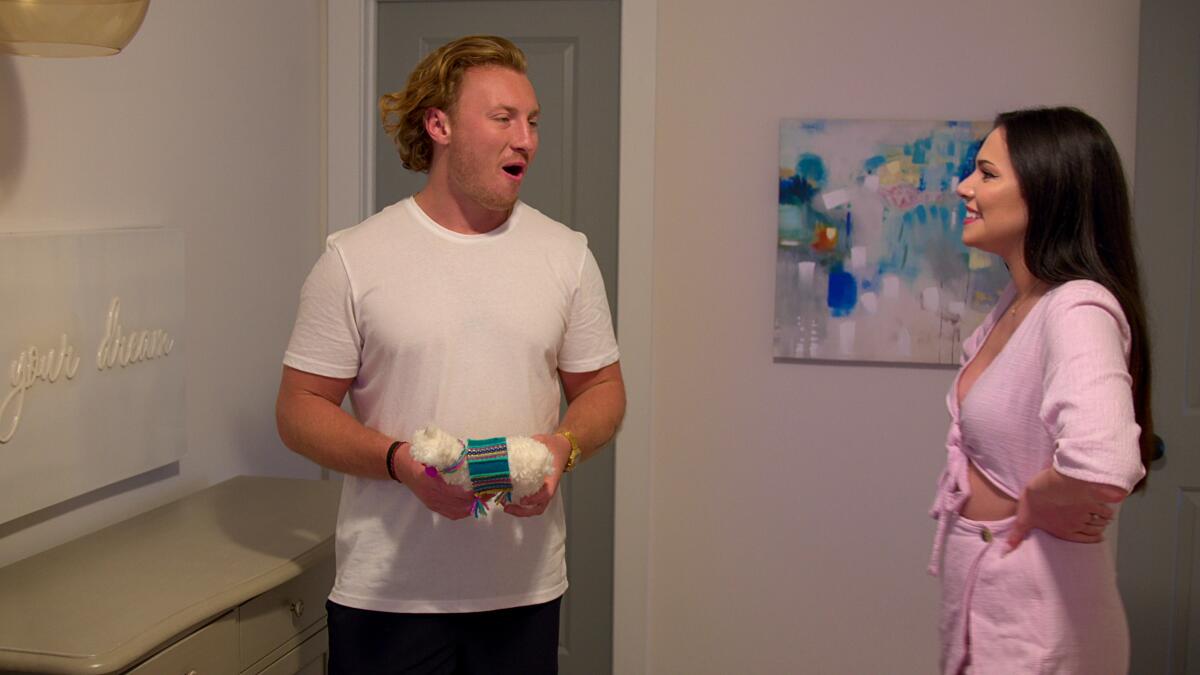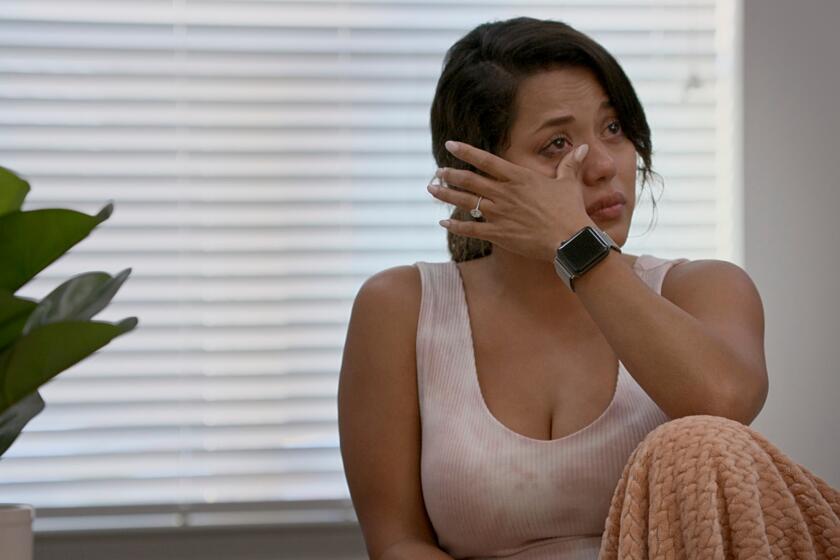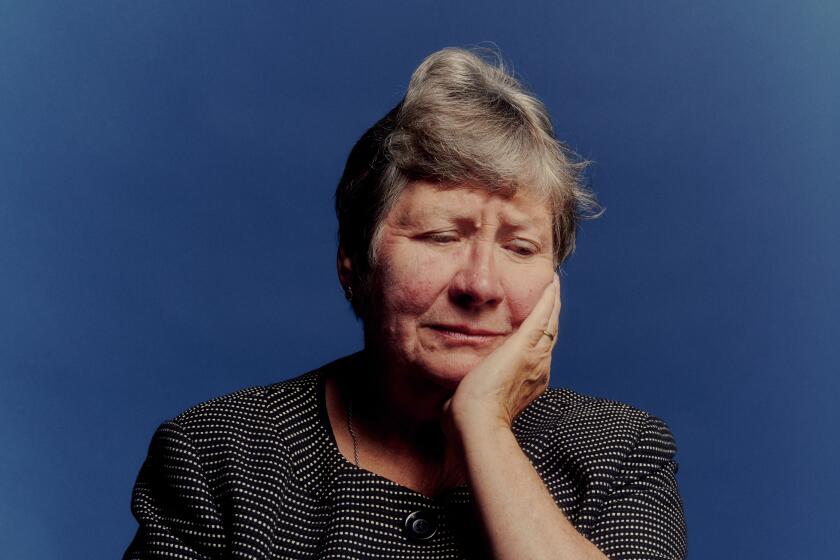‘Love Is Blind’ illustrates the problems with sex ed and abortion conversations in America

- Share via
Believe it or not, every season of “Love Is Blind” offers valuable life lessons to every viewer who is patient enough to sit through 10-plus hours of people careening recklessly toward marriage while drinking wine from gold goblets and look for the kernels of wisdom hidden in all the mess.
This season I have learned numerous useful things — like why you shouldn’t tell the guy you’re dating through a wall that you look like “MGK’s girlfriend” unless you are, in fact, Megan Fox; the dangers of eating too many piping hot taquitos from a beachfront buffet and being unable to kiss your fiancé as a result; and the fact that Charlotte, N.C., has some of the most soulless corporate housing the world has ever seen.
But more than anything, this season has offered a stark reminder about the dismal state of sexual education and reproductive health awareness in this country. This lesson comes courtesy of Johnny McIntyre and Amy Cortés, the first couple to get engaged and, in most ways, the most stable pairing in an otherwise chaotic and scandal-ridden season of Netflix’s reality train wreck.
So far in the “experiment,” as “Love Is Blind” participants are seemingly required to call the show, McIntyre and Cortés, both 28, have really faced only one obstacle, but it’s a doozy. During their romantic getaway to a scenic resort in the Dominican Republic, the newly engaged couple did not sleep together. Not because of a lack of physical attraction — both claim to be very hot for each other — or religious or moral objection to premarital sex.
The issue, it turns out, is that McIntyre is deeply afraid of causing an unplanned pregnancy and Cortés isn’t on any form of hormonal birth control, a fact that catches him completely off-guard, as if every woman in the United States is handed a prescription for the pill when she turns 18 (If only!).
“I always thought that, like, everyone was on birth control. 100%. Like, I was so ignorant on that,” McIntyre says during a friendly chat about his relationship with another cast member, Laura Dadisman, adding that he tended to absorb this information through passive observation, since “every girl I dated was complaining about birth control.” (It’s odd, yet somehow fitting, that Cortés isn’t there to speak for herself in the scene.)
Season 3 contestant Nancy Rodriguez opens up about her failed relationship with Bartise Bolden, talking abortion on a Netflix reality show and more.
With editors having firmly established this couple’s particular storyline as “figuring out how to have sex without getting pregnant,” McIntyre and Cortés returned to Charlotte and began cohabiting in their AI-generated home. The subject of contraception comes up again. He says he’s “terrified” of one mistake leading to a “Johnny Jr.” in nine months because he would like to be financially secure before having kids. It’s a reasonable and laudable goal, even if McIntyre is hilariously misguided about what makes kids so expensive. (Hint: It’s not buying them “a brand new wardrobe every year,” which is not a thing anyone should do; it’s child care.) She suggests maybe he get a vasectomy, and he seems open to exploring the option.
“Johnny’s fear about the whole kids situation is the biggest roadblock to intimacy,” Cortés says later in a confessional interview. “I feel like Johnny’s really scared.” She explains that she has talked to her doctor about going on the pill, which could also help with her anemia, but she is reluctant to do it because, she says somewhat vaguely, “I like how regular everything is in my system.
“We have to, like, research and kind of figure out a solution pretty soon before the wedding,” she concludes.
At this point, many viewers found themselves wondering, “Have these people ever heard of condoms? Or IUDs? Or numerous other safe, reliable forms of contraception?”
And, well, the answer is yes, as Cortés felt compelled to explain in a social media post.
They “1000%” discussed using condoms, she said in an Instagram story last week, “But we still saw it as a risk at the time.” (Condoms are 98% effective when used properly, according to Planned Parenthood.) Presumably, these conversations occurred off-camera or were left on the cutting-room floor.
She also further explained her reluctance to take birth control, saying she is concerned about potential effects it might have on a rare hereditary disorder that affects her blood vessels and spoke about how, as a Latina, she shied away from discussing topics like contraception. She also insisted that she never felt any pressure from McIntyre about her decision.

“We live in a country where sex ed is not the best. Let’s be honest,” she wrote, hitting the nail on the head. “His willingness to learn and explore further options without any pressure was something I respected and appreciated as a woman.” Cortés also said she raised the idea of a vasectomy in part “because I feel like society pushes women to be responsible for these decisions and never men.”
In the latest batch of episodes, released Wednesday, McIntyre shares what he has learned about getting a vasectomy. Spoiler alert: He’s not into it.
“I didn’t realize how actually, like, severe it is,” he explains in a confessional. “They go in, they cut a little vein, so when you uh” — he looks around and laughs nervously, apparently unwilling to say “ejaculate” — “it doesn’t get her pregnant. It was not what I expected at all. I thought it was a quick little tying, put a bow on something and you’re good to go. And then I see it, and I’m like, ‘Maybe not…’ I don’t know if it was something that people went over in school, during normal sex ed. But yeah, never really knew about that.”
Although “Love Is Blind” generally skirts the issue of electoral politics — we never explicitly hear whom anyone voted for in the last election — the show often touches on sensitive cultural issues, and birth control and abortion are topics that have come up repeatedly over the course of the series. The sometimes maddening conversations about these subjects say just as much about the future prospects of the couples having them as the country’s state of mind in this peculiar, post-Dobbs moment.
In Season 3, the relationship between Nancy Rodriguez and Bartise Bowden began to unravel during a conversation about their timeline for having kids, which led to discussion of abortion.
Bowden, who was five years younger than his then-fiancée, said “you can get one pass” if you’re young and find yourself dealing with an unplanned pregnancy — but that was it. He found the idea of considering abortion because of a diagnosis such as Down syndrome unthinkable. Rodriguez took a more nuanced view. “I don’t think that there’s like a number that you can just say, like one time to f— up,” she said. “What if the second time you get raped?”
It was clear that Bowden thought about abortion in reductive, oversimplified terms, and hadn’t considered the many reasons someone might have one, other than being young and irresponsible. (Even though, as of 2020, most women who have abortions already have at least one child, according to statistics from the Centers for Disease Control and Prevention, and a mere 8% are teenagers.) It was either deeply ironic or completely inevitable that Bowden, who ultimately turned down Rodriguez at the altar, unexpectedly became a father shortly after his stint on “Love Is Blind.” (He also claims his views on abortion have changed.)
It’s also worth noting that Season 3 was filmed in Dallas in 2021, the same year Texas instituted a ban on abortion after six weeks of pregnancy, a law rooted in faulty ideas about when a “fetal heartbeat” can be detected, and it aired in 2022, a few months after the Supreme Court overturned Roe vs. Wade. Current Texas law makes no exceptions for rape or incest, and according to one study, an estimated 26,000 Texans have become pregnant as a result of rape since the Dobbs decision.
Many fans have expressed hope that “Love Is Blind” will relocate to other parts of the country after four seasons in the South — and two in Texas alone — even though culture wars over abortion, birth control and sexual education are by no means limited to a single geographical region.
Texas also does not prioritize sex education in schools. Parents are required to actively opt in to sex education for their children by providing written permission, rather than opting out if they are opposed. The state’s updated curriculum, which was instituted in 2022, does not include instruction about consent, sexual orientation or gender identity, and it emphasizes abstinence.
In HBO’s “The Janes,” women who defied abortion laws in pre-Roe Chicago speak out: “The true story is more dramatic than a fictional one.”
Season 6 is set in North Carolina, a once-purple Southern state that has lurched rightward the last few election cycles. In 2023, North Carolina set a 12-week limit on most abortions. The state education curriculum stresses abstinence and the importance of sex only within marriage, though this is hardly an anomaly in the United States. Less than 50% of adolescents surveyed between 2015 and 2019 reported that they received instruction on how to access birth control before they had sex for the first time, according to a report by the Guttmacher Institute, and “more adolescents reported that they had received instruction about saying no to sex or waiting until marriage than about where to obtain birth control or how to use a condom.” Adolescents also were less likely to report receiving instruction on sex education than they had been in 1995.
It’s little wonder that McIntyre, and many people like him, have never learned about what really happens when you get a vasectomy — and are more willing to get engaged to a stranger through a wall than use medically accurate terms to describe their own bodily functions.
This season also featured a pod conversation between Jeramey (yes, that’s how it’s spelled ) Lutinski and a woman he was then dating, Sarah Ann Bick, who described herself as politically conservative and shared her stance on abortion. “I am not a person that is like, ‘Hell yeah, go get an abortion!’ If two people lay down and consensually have sex, I think that you should take responsibility for your actions,” she said. “If you are sexually abused or raped and you end up pregnant by someone, I think the option should definitely be there, but I don’t think it’s used as a form of birth control.”
Their conversation, while not exactly romantic, is increasingly typical for people dating in an era of tribal politics. According to a report on dating in America by Match cited by Time, two out of three single women would not date someone with opposing views on abortion, “and 13% of active daters in the U.S. — about 9.8 million people — have said that the decision to overturn Roe vs. Wade has made them more hesitant to date.” The editorial board of the Washington Post recently argued that political polarization among young people posed a threat to marriage.
Reality TV makes it easy and even tempting to sneer at people like McIntyre and Cortés because of what they don’t know or haven’t asked. But if anything, they should be praised for their willingness to have open, honest — if occasionally exasperating — conversations about their private life on camera, and for acknowledging the biases, blind spots and fears rooted in their cultural and socioeconomic backgrounds. If only more of their co-stars — not to mention countrymen — would do the same.
Then we could rely on “Love Is Blind” to teach us the things that really matter, like the meaning of “bean dip.”
More to Read
The complete guide to home viewing
Get Screen Gab for everything about the TV shows and streaming movies everyone’s talking about.
You may occasionally receive promotional content from the Los Angeles Times.








